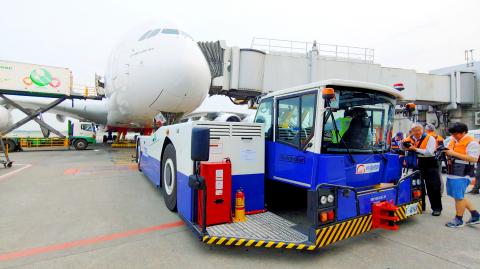Taoyuan International Airport Corp (TIAC) plans to spend nearly NT$200 billion (US$6.47 million) over 14 years upgrading infrastructure at Taiwan Taoyuan International Airport, following a comprehensive, one-month evaluation of the airport by experts.
The Ministry of Transportation and Communications on Wednesday said that it has budgeted about NT$199 billion for a project to revamp the airport’s facilities, which was initiated last year and is to run until 2032.
The budget would also cover the construction of Terminal 3 and the Third Runway.

Photo: Tony Yao, Taipei Times
The nation’s largest international airport has been viewed by some as a “national embarrassment” due to a series of incidents — such as occasional blackouts at terminals and flooding caused by toilet congestion to potholes on the runways — caused by its superannuated facilities, which have been in use for 40 years.
After the nation was pummeled by plum rains on Tuesday night, flooding was found in Terminal 2 due to water leaking from the terminal’s roof.
The evaluation would help tackle problems in three major areas: the airport’s power supply system, its sewage system and the runways and taxiways, the company said in a briefing on Wednesday.
Passenger volume at the airport has grown 86.7 percent over the past 10 years, with the number of daily flights ranging between 700 to 800, TIAC maintenance department head Sun Hong-bin (孫宏彬) said.
During peak hours, nearly 50 flights take off or land at the airport per hour, he said.
The airport’s power demand has risen 460 percent since operations began in 1979, Sun said, adding that there have been numerous short circuits, as the facility’s only substation has been in use for more than 20 years.
To address the power issues, the company is to build two substations by 2022 to offer electricity on redundant circuits, he said.
The evaluation also identified several major problems related to the maintenance of the runways and taxiways, Sun said.
The airport’s runways and taxiways must handle the landings and takeoffs of more than 700 flights per day on average, a heavy burden that makes it difficult to inspect and maintain them, he said.
The division of maintenance work was not clear and runway pavement now requires major renovations, Sun said.
In addition to increasing the frequency of traditional inspections and preventive maintenance for runways, he said that the company would use a mobile image-recognition system for inspections and is complete work to resurface the runways this year and in 2022.
Congestion in the airport’s sewage system is often caused by garbage discarded by travelers, Sun said.
The company has imported machinery to quickly drain pipes, he said, adding that it would conduct a quarterly draining of drainpipes in the airport’s 242 lavatories, as well as drain 20 heavily used toilets each month.
In addition to inspecting airport facilities more frequently, conducting “preemptive” maintenance of facilities and having more emergency response drills, the company said has also offered mid- to long-term solutions to address problems that may arise at the airport, including building back-up systems for every aspect of the airport’s operations and using the Internet of Things to help monitor the situation at the airport.

Three Taiwanese airlines have prohibited passengers from packing Bluetooth earbuds and their charger cases in checked luggage. EVA Air and Uni Air said that Bluetooth earbuds and charger cases are categorized as portable electronic devices, which should be switched off if they are placed in checked luggage based on international aviation safety regulations. They must not be in standby or sleep mode. However, as charging would continue when earbuds are placed in the charger cases, which would contravene international aviation regulations, their cases must be carried as hand luggage, they said. Tigerair Taiwan said that earbud charger cases are equipped

Foreign travelers entering Taiwan on a short layover via Taiwan Taoyuan International Airport are receiving NT$600 gift vouchers from yesterday, the Tourism Administration said, adding that it hopes the incentive would boost tourism consumption at the airport. The program, which allows travelers holding non-Taiwan passports who enter the country during a layover of up to 24 hours to claim a voucher, aims to promote attractions at the airport, the agency said in a statement on Friday. To participate, travelers must sign up on the campaign Web site, the agency said. They can then present their passport and boarding pass for their connecting international

Temperatures in northern Taiwan are forecast to reach as high as 30°C today, as an ongoing northeasterly seasonal wind system weakens, the Central Weather Administration (CWA) said. CWA forecaster Tseng Chao-cheng (曾昭誠) said yesterday that with the seasonal wind system weakening, warmer easterly winds would boost the temperature today. Daytime temperatures in northern Taiwan and Yilan County are expected to range from 28°C to 30°C today, up about 3°C from yesterday, Tseng said. According to the CWA, temperature highs in central and southern Taiwan could stay stable. However, the weather is expected to turn cooler starting tonight as the northeasterly wind system strengthens again

Taiwan sweltered through its hottest October on record, the Central Weather Administration (CWA) said yesterday, the latest in a string of global temperature records. The main island endured its highest average temperature since 1950, CWA forecaster Liu Pei-teng said. Temperatures the world over have soared in recent years as human-induced climate change contributes to ever more erratic weather patterns. Taiwan’s average temperature was 27.381°C as of Thursday, Liu said. Liu said the average could slip 0.1°C by the end of yesterday, but it would still be higher than the previous record of 27.009°C in 2016. "The temperature only started lowering around Oct. 18 or 19